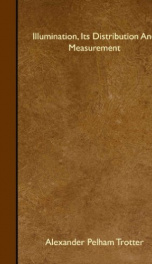illumination its distribution and measurement

ILLUMINATION ITS DISTRIBUTION AND MEASUREMENT - PREFACE - THIS book is intended to advance the subject of illuminating engineering or the art of directing and adapting light. It is divided into three parts. The first deals with the primary and the derived units of light, the theory of the distribution of illumination and the application of that theory to the spacing and the height of lamps. The second part describes instruments and methods employed for measuring light and illumination. The last part gives a few practical examples of the measurement of illumination. The art of illumination, wrote Count Rumford in the year I 789, although . it is undoubtedly one of the most useful that has been invented by man, and contributes perhaps more than any other to his comfort and convenience in all countries and in every class of society, has not even been considered as an art for the technical terms have not been invented which are indispensably necessary in order to render it possible to treat of it in a clear and satisfactory manner. One hundred and three years later, on May To, 1892, a paper, of which the present volume is an expansion, was read before the Institution of Civil Engineers, was awarded a Telford Medal and a Telford Premium, and was ublished in volume cx. of the Proceedings of the Institution. The subject still continued to attract little attention, and after sixteen years, at the invitation of Mr. Leon Gaster, and with the permission of the Council of the Institution of Civil Engineers, the Paper was rewritten and appeared in The Illzcmifzating Efzgineer. It has now been revised and extended and is offered not as a complete treatise, but as a record of the work of others and of my own investigations in evening hours, scant holidays, and spare moments. It would not be possible within the compass of a single volume to deal comprehensively with the art of illumination. The scope of this book is limited to the principles and methods of distribution and measurement of illumination. The subject of photometry proper has been made subordinate, descriptions of systems of lighting and various kinds of lamps and appliances have been excluded, and the temptation to touch on innumerable side issues of scientific interest has been resisted. The theory of the distribution of illumination is excellently adapted for mathematical treatment, but I have preferred to deal with it in the manner in which it appeals to me, believing that for practical engineers the use of graphic methods will be more useful than equations and formulae. The calculated curves and diagrams have been drawn on a large scale and most of them are accurate within the thidkness of the line. The original works of nearly all the quoted writers have been consulted, not only for the purpose of verifying references and correcting them when erroneous, but for presenting in their own words and with their own illustrations some idea of the work of the old masters of photometry. I have to express my thanks to Professor Silvanus Thompson for the loan of valuable old books, and to Professor J. T. Morris for reading most of the manuscript, and for his useful criticistlls and suggestions, to Mr. J. Rennie for help with some of the computations, and to Mr. P. Webberley for assistance in revising proofs. A. P. TROTTER. Introtluctory, I . Intensity or Candle-po i. er, 1. Unit. incl Standards, 3. The Carcel, 3. The 13ritish Candle, 4. The erman C ntlle, 4. The Harcourt or Pentane Lamp, 4. The Heflier or Alnyl-acetate L I I I j . , The Violle, 7. Ihe Bougie-dtcimale, S...
Info about the book
Author:
Series:
Unknown
ISBN:
0819443360
Rating:
3/5 (4)Your rating:
0/5
Languge:
English
Users who have this book
Users who want this book
What readers are saying
What do you think? Write your own comment on this book!
write a commentif you like illumination its distribution and measurement try:
Other books by this author
Do you want to read a book that interests you? It’s EASY!
Create an account and send a request for reading to other users on the Webpage of the book!

